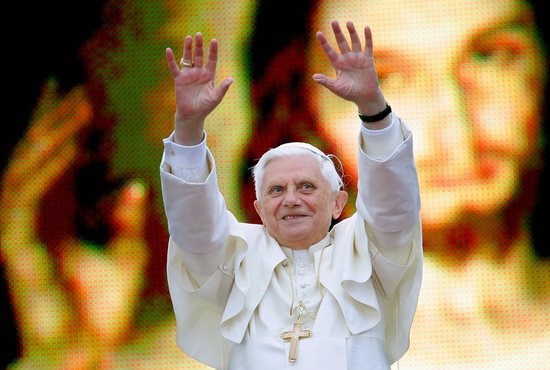
Catholic evangelizers are recalling the profound impact the late Pope Benedict XVI had on the Church’s mission of evangelization — a legacy that placed Jesus Christ at the heart of any effort to share the Gospel.
“A personal relationship with Jesus — he always came back to that,” said Sherry Weddell, author of “Forming Intentional Disciples” and executive director of the Colorado Springs, Colorado-based Catherine of Siena Institute, which provides parish resources for faith formation in discipleship and evangelization.
“Before we can go out and proclaim God, we must first know God ourselves. Pope Benedict XVI knew this was key to evangelize,” said Curtis Martin, founder and CEO of FOCUS, a Catholic outreach to college and university students.
In an email to OSV News, Martin noted Pope Benedict significantly advanced the evangelization initiatives of Pope St. John Paul II, seeking to “reawaken the Christian faith in areas where it (had) once thrived, but had declined.”
Martin said he was honored to have been appointed by the late pope, whom he had known “for more than 30 years,” as a consultor to the Pontifical Council for Promoting the New Evangelization, which Pope Benedict established in his 2010 motu proprio “Ubicumque et Semper.” (In June 2022, the council was merged with the former Congregation for the Evangelization of Peoples to create the Dicastery for Evangelization.)
Pope Benedict “understood the connection between solid faith formation and evangelization,” said Father Hezekias Carnazzo, a Melkite Catholic priest and founding executive director of the adult catechetical Institute of Catholic Culture based in McLean, Virginia.
For the late pope, that dynamic required “always required asking the question of who God is,” said Father Carnazzo, noting that Pope Benedict “very clearly answered that question with his encyclical ‘Deus Caritas Est’ (‘God is Love’), in which he reminds us that God is love, and love is the giving of ourselves to the beloved.”
That message radiated in the late pope’s writings, said Weddell, who “quoted him extensively” in her book “Forming Intentional Disciples: the Path to Knowing and Following Jesus,” an updated edition of which was published in November by OSV Books.
“The language he used was so clear,” Weddell said. “He talked about Jesus as living, present and active in his life, and was seeking … to help others have that same encounter.”
Saul Keeton, a former Episcopalian who came into full communion with the Catholic Church, said Pope Benedict’s election marked “the true beginning” of his Catholic formation.
“His papacy and his writings on the liturgy helped me to find my own voice,” said Keeton, now the advancement director for Family Missions Company in Abbeville, Louisiana. “I deeply appreciated the way he explained the beauty of the liturgy, and how important it was for us as humans to tap into that.”
For many young people, particularly those of post-Millennial or “Gen Z” demographic, “Pope Benedict’s papacy and evangelization was foundational and formative,” said Martin. “He loved young people and brought them … to Jesus. He was their calm shepherd — his trust and his peace, which came from Our Lord, led the way.”
Keeton pointed to Pope Benedict’s “very logical approach to exegesis and the fact that it began from a place of faith.” Keeton admitted he was “binging on Benedict podcasts” during his travel to the Jan. 2-6 SEEK23 conference in St. Louis.
Yet the late pope’s greatest proclamation of the Gospel may well have been a silent one, said Keeton.
Pope Benedict, the first pope to resign in 600 years, “spent the majority of his post-election years primarily as a contemplative intercessor,” said Keeton. “I have to imagine at times it was very lonely for him; he had to have known (his resignation) would be misunderstood. He took on this mystical element, and the suffering was unique.”
The late pope’s final years witnessed to all that he had written about the faith, said Weddell.
“What we have in him is a brilliant theologian who had lived it,” she said. “He had prayed it through, and you could tell by the way he talked about Jesus, his friend.”
Gina Christian is a National Reporter for OSV News.



